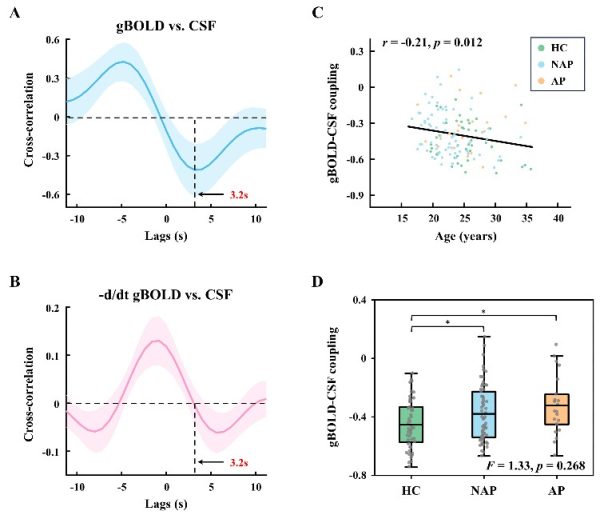News Express: UM research team finds link between impaired brain waste clearance and early psychosis
新聞快訊:澳大團隊發現早期精神病與腦類淋巴系統功能受損有關

BOLD-CSF耦合強度與年齡相關,並在不同診斷組間存在差異
BOLD-CSF coupling is associated with age and varies significantly between different groups
澳大團隊發現早期精神病與腦類淋巴系統功能受損有關
由澳門大學認知與腦科學研究中心主任、健康科學學院教授袁振領導的開創性研究,首次發現早期精神病患者大腦廢物清除系統(類淋巴系統)功能異常,為精神疾病的早期診斷和干預提供了新型神經影像學生物標誌物。相關研究成果已發表於國際頂級精神病學與神經科學期刊《分子精神病學》(Molecular Psychiatry)。
腦淋巴系統是大腦中負責代謝廢物清除的重要通路,在維持神經健康方面發揮關鍵作用。已有研究表明,該系統功能障礙與阿爾茨海默症、帕金森病等神經退行性疾病密切相關。然而,在精神類疾病,尤其是精神病的早期階段,該系統是否存在功能異常、是否與症狀相關,仍缺乏系統的研究和明確證據。
在該研究中,澳大團隊分析了137名16至35歲青年參與者的多模態磁共振成像數據,包括健康對照組、非情感性精神病患者及情感性精神病患者。團隊特別測量了大腦皮層活動(BOLD信號)與腦脊液流動(CSF信號)的耦合強度,該指標可反映腦廢物清除效率。
研究結果顯示,早期精神病患者的BOLD-CSF耦合顯著減弱,且發生延遲,提示其腦內廢物清除功能存在障礙。其中,情感型精神病患者的異常最為明顯,表明腦淋巴系統功能可能在疾病初期即受到損害(圖1)。進一步分析發現,BOLD-CSF耦合強度的下降不僅與認知功能減退密切相關,包括流體智力、注意力、工作記憶和語言能力等多個維度,還與更高的焦慮水平顯著相關。這一現象可能與精神病常見的睡眠障礙和慢性炎症狀態密切相關,反映出其對腦清除系統的廣泛影響。
研究還發現,該功能障礙在大腦高級認知區域(如默認模式網絡和前額頂葉網絡)中最為顯著,而低級感覺運動區(如視覺和軀體運動網絡)受影響較輕,呈現出“自上而下”的損傷模式(圖2)。這種層級性特徵提示,精神病可能首先損害負責複雜認知加工的腦區,隨後影響更基礎的感知功能區域。
此外,該研究提出的BOLD-CSF耦合指標在多個獨立數據集中均表現出良好的穩定性與可重複性,具備跨樣本和跨平台的可靠性(圖3)。該指標有望作為精神疾病的影像學生物標誌物,應用於早期篩查、疾病監測、治療響應評估等臨床場景,拓展精神障礙客觀量化的診斷與干預路徑。
該研究通訊作者為袁振及澳大認知與腦科學研究中心研究助理教授趙治瀛,第一作者為博士畢業生華林,博士畢業生曾星霖、碩士畢業生張凱茜亦參與該研究。該項目獲澳門特別行政區科學技術發展基金(檔案編號:0014/2024/RIB1、0015/2023/ITP1)及澳門大學(檔案編號:MYRG-GRG2023-00038-FHS、MYRG-GRG2024-00259-FHS)資助。全文請瀏覽:https://doi.org/10.1038/s41380-025-03058-1。
欲瀏覽官網版可登入以下連結:
https://www.um.edu.mo/zh-hant/news-and-press-releases/campus-news/detail/61317/
UM research team finds link between impaired brain waste clearance and early psychosis
A research team led by Yuan Zhen, head of the Centre for Cognitive and Brain Sciences (CCBS) and professor in the Faculty of Health Sciences (FHS) at the University of Macau (UM), has for the first time identified dysfunction in the glymphatic system, the brain’s waste clearance system, among patients with early psychosis. The team also offered a novel neuroimaging biomarker for the early diagnosis and intervention of psychiatric disorders. The research has been published in Molecular Psychiatry, a leading international journal in neuroscience and psychiatry.
The glymphatic system plays a vital role in clearing metabolic waste and maintaining neural health. Previous studies have shown that dysfunction of the glymphatic system is closely linked to neurodegenerative diseases such as Alzheimer’s and Parkinson’s. However, systematic studies and clear evidence on its involvement in psychiatric disorders, particularly in early psychosis, are lacking.
In this study, the research team analysed multimodal MRI neuroimaging data from 137 participants aged 16 to 35. These participants included healthy controls, individuals with non-affective psychosis, and individuals with affective psychosis. The team measured the coupling between the cortical blood-oxygen-level-dependent (BOLD) signal and the ventricular cerebrospinal fluid (CSF) flow, which served as a biomarker for the brain’s waste clearance efficiency.
The results showed that BOLD-CSF coupling was significantly weakened and delayed in patients with early psychosis, suggesting glymphatic dysfunction. Patients with affective psychosis exhibited the most pronounced abnormalities, indicating that their glymphatic systems may be impaired at an early stage of the disease (Fig. 1). Further analysis revealed that reduced BOLD-CSF coupling correlates with declines in fluid intelligence, concentration, working memory, and language skills, as well as higher anxiety levels. The reduced BOLD-CSF coupling may also be closely related to sleep disorders and chronic inflammation, which are commonly associated with psychosis, reflecting the condition’s extensive impact on the glymphatic system.
The study also found that the dysfunction was most pronounced in high-order cognitive networks (e.g. default mode and frontoparietal networks), while lower-order sensory and motor regions (e.g. visual and somatomotor networks) were less affected. This suggests a ‘top-down’ pattern of impairment in early psychosis (Fig. 2). This pattern indicates that psychosis may first damage the brain regions responsible for complex cognitive processing before affecting the regions responsible for sensory processing.
In addition, the proposed BOLD-CSF coupling index demonstrated high stability and reproducibility across multiple independent datasets (Fig. 3), showing strong reliability across different platforms and populations. It will be a promising neuroimaging biomarker for psychiatric disorders, which can enhance early detection, disease progression monitoring, and therapeutic response assessment, thus improving the objective and quantitative diagnosis and intervention of psychiatric disorders.
The corresponding authors of the study are Prof Yuan and Zhao Zhiying, research assistant professor in CCBS. The first author is doctoral graduate Hua Lin. Doctoral graduate Zeng Xinglin and master’s graduate Zhang Kaixi also contributed to the study. The research was funded by the Science and Technology Development Fund of the Macao SAR (File No.: 0014/2024/RIB1 and 0015/2023/ITP1), and UM (File No.: MYRG-GRG2023-00038-FHS and MYRG-GRG2024-00259-FHS). The full version of the research article is available at: https://doi.org/10.1038/s41380-025-03058-1.
To read the news on UM’s official website, please visit the following link:
https://www.um.edu.mo/news-and-press-releases/campus-news/detail/61317/